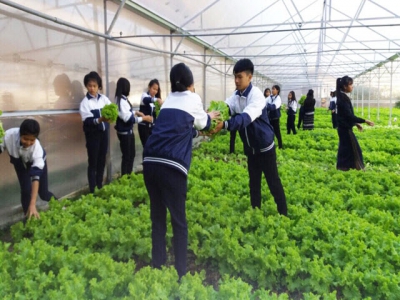Lam Dong students practice high-tech agriculture

A number of localities have incorporated high-tech agriculture into school training programs, as a new and practical approach and long-term investment. At the center of Da Lat City, there is a high-tech garden for vegetables and flowers, where every day students of the Lam Dong Ethnic Boarding School practice what they have learned about crop plants and farming.
Lam Dong students practice high-tech agriculture - Students of Lam Dong Ethnic Boarding School practise farm work.
Located at the Lam Dong Ethnic Boarding School and covering an area of more than 500 m2, the glasshouse garden are equipped with fertilizer irrigation and an automatic watering system. Another plot of land near the flower garden is equipped with a hydroponic system for safe vegetable cultivation.
The garden is where teachers and students to practice farming like real farmers and their earnings from farming will be donated to the school’s Study Encouragement Fund.
Teacher Nong Van Hung, Secretary of the school’s Youth Union, said teachers instruct students while the students take responsibility for the 6,400 USD garden ranging from seeding to fertilizer preparation, the watering timer, and fertilization.
After a season of cultivating flowers and vegetables, the students’ knowledge on farming has improved greatly. Most of them know how to read the level of humidity to determine which diseases the plants are susceptible to, and take measures against the pests.
Hung underscored the importance of teaching the students to love farming and apply high-tech techniques, noting the benefits of these practices for the ethnic minority people in the future.
“We will use part of the money earned from selling vegetables and flowers to finance the Youth Union’s activities. The school’s Study Encouragement Fund will help buy materials, learning aids, and gifts for disadvantaged pupils in remote areas,” said Hung.
12th grader Da Gat Phuong said thanks to caring for the garden, she has gained more knowledge on how to grow vegetables and flowers in a modern way. She is now able to adjust the amount of water and fertilizer suitable for each development stage of the crops.
“Thanks to the program, we have learned techniques to soften the soil, and how to use various types of fertilizers and understand the steps to best develop vegetables. We can also apply the techniques we learn at school to help our parents,” Phuong said.
Since the onset of the program, the students have become very familiar with all phases of cultivating vegetables or flowers.
Ya Duyet, a student of class 12A, said apart from the knowledge provided by teachers, he himself often searches for more information from books and the Internet to find the best way to look after the garden.
According to Duyet, “Since the model was launched, we are more hard-working and less distracted, while our team work skills have improved. We have worked more harmoniously and efficiently.”
Pham Thi Hong, the school’s principal, said the money from the harvested vegetables and flowers is used for school programs and contributes to the Study Encouragement Fund.
Có thể bạn quan tâm
 China tightens import standards for Vietnamese fruits
China tightens import standards for Vietnamese fruits China now requires Vietnam to provide stamps of origin, area code and phytosanitary certificates for fruits that it exports.
 China tightens control over fruit imports from Vietnam
China tightens control over fruit imports from Vietnam Over the last two months, Chinese traders have only bought durians stamped with codes of origin traceability.
 An Giang to export mangoes to US in June
An Giang to export mangoes to US in June The Mekong Delta province of An Giang plans to export about 5-10 tonnes of mangoes to the US in June, according to deputy director of the provincial Department